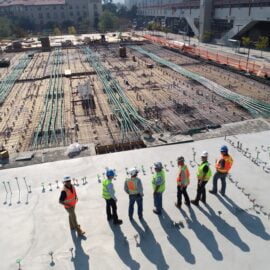Building an Extension – Professionals You Need In 10 Easy Steps: Award the contract

Step 10 – Contract award and prepare the formal contract
At last we are finally here and only a couple of weeks away from starting on site with our chosen contractor from the tender report, exciting stuff!
We now need to get formal contracts drafted and final terms documented so we can progress to the contract award, firstly what contract do we need?
Form of contract
In the majority of cases we would recommend the JCT (The Joint Contracts Tribunal) suite of contracts, your chosen builder will of worked with JCT type of contract previously so will be familiar with how they work and what is required of them
Type of contract
Within the JCT form of contract there are further Contract families, these are in their broadest terms tailored to different complexity, risk, and cost of project.
Minor works – Minor works building contract (MW)
The minor works family of contract is suited to exactly what it say on the tin, minor works. The joint contracts tribunal description of the minor works contract is
“The JCT Minor Works Building Contract is designed for smaller, basic construction projects where the work is of a simple nature.”
Intermediate – Intermediate building contract (IC)
The intermediate building contract is basically the next step up from the minor works building contract where works are more complex but still within the realms of a domestic project.
The joint contracts tribunal description of the intermediate works contract is
“The JCT Intermediate Building Contract is designed for construction projects involving all the recognised trades and skills of the industry, where fairly detailed contract provisions are needed, but without complex building service installations or other specialist work. “
CDP (contractors design portion)
Either of the above contract families, Minor and Intermediate, can have a contractor’s design portion within the contract, this is useful for instance the electrical & heating system is to be replaced and you wish the responsibility to be with the contractor to design and install a compliant & fit for purpose system.
This reduces your risk and also means that you won’t need to commission a design from a third party designer, so saving some cost.
Design & Build – Design and build contract (DB)
This form of contract is where the contractor takes full responsibility for the design or completes the design
We wont cover this in detail here as it can be more complex than the level required for works to a home extension and refurbishment project.
Completing the contract
Contract documents cost around £30 – £50, these are normally in paper format purchased from the contract provider i.e. The Joint Contracts Tribunal (JCT)
The contracts are now slightly easier to administer by using JCT on demand where everything is completed online, and a copy of the final contract award is downloaded in PDF format ready for signing.
We find this a more efficient way of working as everything is electronic and only a couple of pages will need printing rather than the full paper copy contract.
The main areas that will need completing within the contract documentation have already been provided by the quantity surveyor and building contractor
Where the works are to be carried out, so your property address, who the work is being carried out for ‘The Employer’ who is carrying out the work for you, ‘The Contractor’
Timescales
The timescale for the contract will be as stated in the contractor’s tender return and detailed within the tender report
Delayed damages
If the contract period runs over what was agreed at the outset then it is important to include delayed damages within the contract, there are standard clauses within the contract that require a value to be formulated.
It may seem tempting to insert a high figure for the delayed damages to appear to incentivise the contractor to complete on time, however it is important that the value is realistic and can be related back to the actual project and your potential losses for an overrun of time.
For instance, these can be legitimate costs you may incur
- If you have furniture in storage and need to pay additional weeks until the works are complete
- You may be living in a rental property whilst the works are completed
- Your support team, for instance project manager, quantity surveyor will incur additional costs
- Insurances that need extending to meet the revised completion date
The delayed damages cannot be seen as a penalty or where you are looking to profit from the contract due to the delays.
If at a later date the worst happens and a dispute arises, the delayed damages, if not supported by documentation of the actual costs incurred by you as mentioned above could result in the claim being unlawful and ultimately reduced or struck out completely.
Signing the contract award
The completed contract will then be sent to the contractor for review and signing, once this is completed you will be required to sign.
Signed copies of the contract will then be distributed to all parties and ready to commence work on site.
The next series of information will concentrate on managing the works on site from Project Management, cost management, variations, & closing out the completed project



